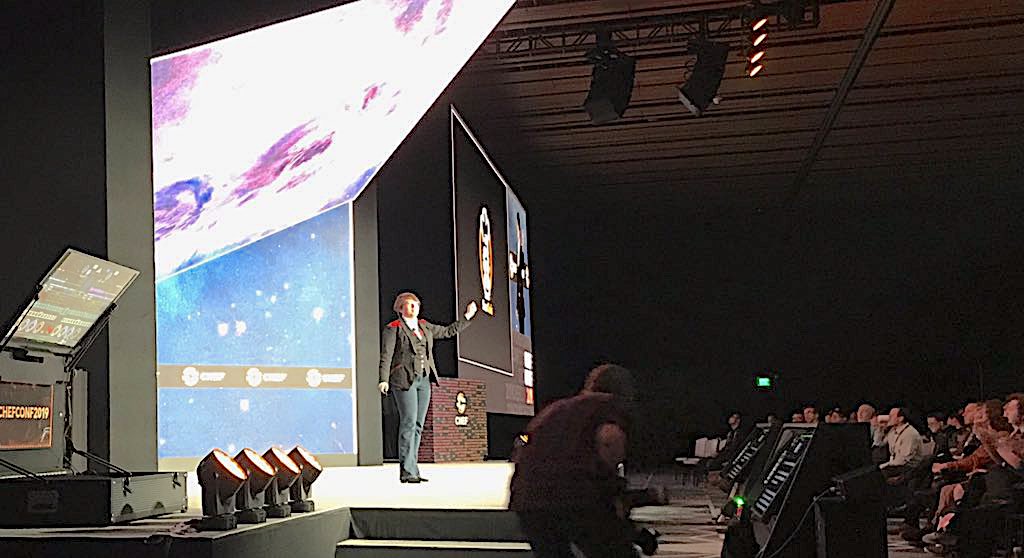 APPS
APPS
 APPS
APPS
 APPS
APPS
Modernize or die. Lift-and-shift. Rip-and-replace.
While enterprises are confronted by these kinds of binary imperatives at many events, it makes sense that the ChefConf 2019 conference this week in Seattle would cater to technologists seeking a third way, since conference sponsor Chef Inc. is a systems configuration management firm.
To the theme, “Automating the Coded Enterprise” and accompanied by a full-time thumping DJ, Chef Chief Executive Barry Crist greeted a campily described audience of “digital ass kickers” and then offered some measured reality.
“This stuff is really hard — collectively, the industry is only 10% of the way along with this,” Crist said of the poor level of end-to-end code automation present in all but the highest-performing enterprises.
Large enterprises are hobbled by high compliance requirements, proprietary, siloed systems and ongoing operational needs. Nobody presenting here expects information technology teams to magically shift to faster, DevOps-style release cycles and “cloud native”-style architectures without paying down technical debt in manual test, deploy and repair cycles.
What an event like this can accomplish is display the discipline necessary to make such a commitment to change. If Brittany Woods of Carfax, a company of such early data legacy that “fax” is literally in the name, can share how their dev and infrastructure teams are now standardizing on automated, defined-as-code environments, maybe there’s hope for the rest of the attendees.
Once known for pioneering and popularizing Infrastructure as Code or IaC recipes, Chef recently pushed all its chips in on open source, announcing their complete Enterprise Automation Stack as 100% Apache 2.0 licensed open source, available on GitHub.
The hosts were actively courting this broader open-source development community, featuring the standout projects and awarding contributors in their ecosystem, in a sort of 10-year renaissance as “The New Chef” seeks to encourage deeper participation in the suite beyond coding infrastructure to complete app environments.
“Open source is a development model, not a business model,” said Chef community engineering lead Nell Shamrell-Harrington (pictured), before exhorting everyone present to stand and pledge “So say we all!” in support of each other’s efforts.
By no means has the business model been left behind, though. The company is still growing an enterprise sales force to serve large customers, who will still demand standardized application suite builds and suite updates, along with the support and resources of an approved vendor.
Demonstrating their “Effortless Infrastructure” pattern, Chef teams showed how an IT operations engineer can scan a given server against hundreds of predefined profiles, identify outdated or problematic packages and vulnerabilities, then remediate and redeploy an updated copy from audited code definitions in under a minute.
Thousands of recipes and methods in Chef Infra and Automate and Inspec tools were recounted here by development peers, while demos of the newer Chef Habitat part of the suite were taking on the more ambitious task of capturing and migrating whole applications-as-code along with environment definitions.
“Businesses have a fleet of applications, and changing one component can impact everything else,” said Chef Senior Vice President Corey Scobie. “We want to use Habitat to change the relationship between infrastructure and applications, to make it ready to run any application in any environment with complete automation.
Most customers I met at the event haven’t dared to fly that close to the sun yet, but I did hear from a couple very large enterprises who were willing to talk off the record about challenging but successful Habitat automation projects. The dream of lifting-and-shifting formerly intractable big-iron apps to new homes in hybrid IT might finally be in reach, if the company can find a way to socialize this capability.
Will Chef’s assertions become reality for their customers? In the end, good intentions and opinions won’t move a digital enterprise from datacenter A to hybrid cloud B. But good, unopinionated code will.
Jason English is principal analyst and chief marketing officer at Intellyx LLC, an analyst firm that advises enterprises on their digital transformation initiatives, and publishes the weekly Cortex and BrainCandy newsletters. (Disclosure: Chef is a former Intellyx customer.)
Support our mission to keep content open and free by engaging with theCUBE community. Join theCUBE’s Alumni Trust Network, where technology leaders connect, share intelligence and create opportunities.
Founded by tech visionaries John Furrier and Dave Vellante, SiliconANGLE Media has built a dynamic ecosystem of industry-leading digital media brands that reach 15+ million elite tech professionals. Our new proprietary theCUBE AI Video Cloud is breaking ground in audience interaction, leveraging theCUBEai.com neural network to help technology companies make data-driven decisions and stay at the forefront of industry conversations.